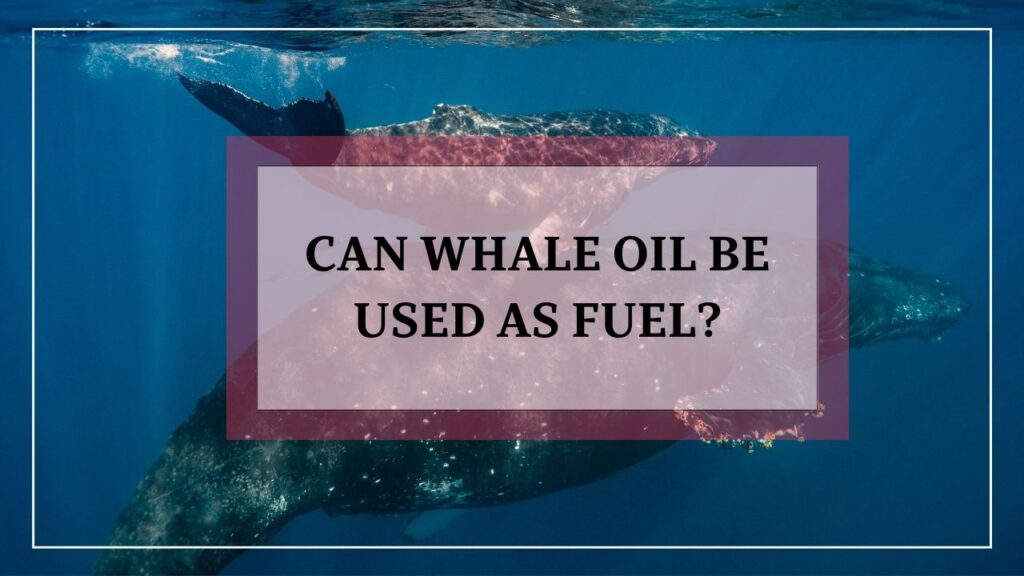Have you ever wondered if whale oil can be used as fuel? It’s a question that has fascinated people for centuries, and one that continues to be a topic of debate today. Whale oil has been used for various purposes throughout history, from lighting lamps to lubricating machinery. However, as our energy needs have grown, so too has the question of whether whale oil could serve as a viable fuel source.
Whale oil is a controversial topic for several reasons. First and foremost, whales are intelligent, social animals that are vital to the health of our oceans. For this reason, any practice that involves harming or killing whales is inherently controversial. Additionally, the use of whale oil as fuel has a complicated history, with some arguing that it played a role in the decline of whale populations in the past.[1]
In this blog post, we’ll take a closer look at the topic of using whale oil as fuel. We’ll explore the pros and cons of this controversial practice, and examine some of the alternatives that are available today.
Can Whale Oil Be Used As Fuel?

Whale oil can be used as fuel, but its use is highly controversial and debated due to the decline of whale populations in the past, the high cost and inefficiency of producing whale oil, and ethical and environmental concerns. There are many other sources of fuel available today that are more efficient, sustainable, and ethical.
The Pros of Using Whale Oil as Fuel
There are some potential advantages to using it as an energy source:
The High Energy Content Of Whale Oil
One of the biggest advantages of using whale oil as fuel is its high energy content. Whale oil is a dense and highly concentrated energy source, which means that it can provide a lot of energy for its weight and volume.
This makes it an attractive option for use in applications where space and weight are at a premium, such as on ships or in remote locations.
Availability Of Whale Oil In Some Regions
Another potential advantage of using whale oil as fuel is that it may be available in some regions where other sources of fuel are not.
While the hunting and harvesting of whales for their oil are controversial and heavily regulated, there are still some places where it is legally allowed. In these regions, whale oil may be a more accessible and cost-effective fuel source than other alternatives.
Potential Environmental Benefits Compared To Fossil Fuels
Finally, there is some evidence to suggest that using whale oil as a fuel source could have environmental benefits compared to fossil fuels.
For one, burning whale oil produces less sulfur and nitrogen oxides than burning petroleum-based fuels, which can reduce air pollution.
Additionally, since whales are a renewable resource (albeit one that is heavily regulated), using their oil as a fuel source could be more sustainable than relying on non-renewable fossil fuels.
The Cons of Using Whale Oil as Fuel
While there are some potential benefits to using whale oil as fuel, there are also many drawbacks to this practice. Here are some of the main cons to consider:
Negative Impact On Whale Populations And Ecosystems
The biggest downside to using whale oil as fuel is the negative impact it can have on whale populations and ecosystems.
Whales are already facing significant threats from climate change, pollution, and overfishing, and using their oil as a fuel source only adds to these pressures.
Whaling has also been historically linked to the depletion of whale populations, and many species are still recovering from centuries of hunting.
High Cost Of Production
Another major issue with using whale oil as fuel is the high cost of production. Obtaining whale oil is a difficult and expensive process, requiring specialized equipment and skilled labor.
This means that whale oil is often much more expensive than other types of fuel, making it impractical for most applications.
Potential For Illegal Hunting And Trade Of Whales
Finally, there is a risk that the use of whale oil as fuel could lead to illegal hunting and trade of whales. This is a significant concern, as many species of whales are still endangered or threatened.
The hunting and harvesting of whales are also heavily regulated by international treaties and agreements, and using their oil as a fuel source could put these protections at risk.
Alternatives to Whale Oil as Fuel
Thankfully, many alternative energy sources can be used instead of whale oil as fuel. Here are some of the most promising options:
Biofuels Made From Renewable Sources
One of the most exciting alternatives to whale oil as fuel is biofuels made from renewable sources. These fuels are derived from plants, algae, and other organic materials, and can be produced sustainably without harming the environment or wildlife.
Biofuels are also much more efficient than traditional fossil fuels and can help to reduce greenhouse gas emissions and combat climate change.
Electric And Hybrid Engines For Ships
Another promising option for powering ships is electric and hybrid engines. These engines are becoming increasingly popular in the shipping industry and can provide significant energy savings compared to traditional diesel engines.
Electric and hybrid engines are also much quieter and produce less pollution, making them a great choice for environmentally-conscious ship owners and operators.
Reduced Fuel Consumption Through Energy-Efficient Practices
Finally, it’s worth noting that reducing fuel consumption through energy-efficient practices can also be a highly effective way to reduce reliance on whale oil and other fossil fuels.
Simple measures like optimizing ship speed and route, reducing unnecessary idling, and improving maintenance practices can all help to reduce fuel consumption and cut costs.
FAQs
Can You Use Whale Oil In Cars?
No, it is not recommended to use whale oil in cars as it can damage the engine and cause pollution.
Can A Diesel Engine Run On Whale Oil?
Yes, a diesel engine can run on whale oil, but it is not recommended due to its negative impacts on whale populations and ecosystems.
What Can Whale Oil Be Used For?
Whale oil has been traditionally used for a variety of purposes, including fuel for lamps, lubrication for machinery, and as an ingredient in cosmetics and soaps.
Is Whale Oil A Biofuel?
Whale oil is not considered a biofuel in the traditional sense, as it is derived from a non-renewable source and has negative impacts on the environment. However, it does have some characteristics of biofuels in terms of being a liquid fuel derived from organic matter.

